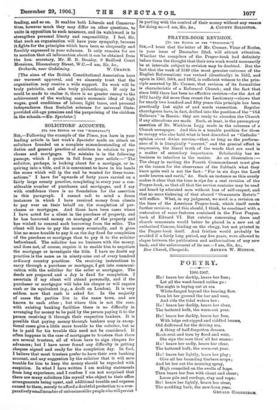SOCIALISTIC LEGISLATION.
[To THE EDITOR OP TUE SPECTATOR."]
SIE,—Many of your readers, no matter to what political party they belong, will be grateful to you for the position which you have taken up in regard to Socialistic legislation,—i.e., the attempt to improve the condition of the working classes by artificial means, a vain effort, for it has signally failed in the past, and will always fail. Naturam expellas furcd, tamen usgue recurret. Such legislation, while possibly mitigating the lot of one section of the poor, must depress the condition of the vast majority. Take, as one example, the establishment of old-age pensions. Those who receive five shillings a week from the community after attaining the age of sixty-five will benefit to that extent ; but it is a comparatively small section of the whole population who require their wages or earnings to be thus supplemented, • and by every economic law the larger section must suffer in pro- portion as the smaller section benefits. Another example is afforded by the free feeding of necessitous school- children,—again an admittedly small class, and with the least deserving parents, who will again be benefited at the expense of the most deserving. In both cases the effect can only be to drag down others to the same condition, and to increase the misery and distress which all desire to alleviate.
Political economy, like philosophy, as Cousin showed, seems
in general to move in circles. A wave of sentiment and false philanthropy (the philanthropy whereby A relieves the neces- sities of B out of the pocket of C) seems to have its high and low water marks at fixed intervals. It last had its high-water mark in England at the close of the eighteenth century, and this was followed by the reaction of 1830, which lasted some fifty years, and was marked by improvement and progress in every direction. But since the "eighties" of the last century, and most markedly during the last fifteen years, the wave has advanced again; and although it will doubtless recede after a time, it will have inflicted great loss and damage in the mean- time, which it will once more take long years to repair.
Unfortunately, no political party at the present time dares to check its progress, or tries to turn it back, although a large mass of influential opinion among all classes of the nation would undoubtedly be willing to join hands to oppose it if there were a fulcrum to work upon. I therefore trespass upon your kindness to call attention to an Association which has been recently formed to make this opinion effective. This is the British Constitutional Association, which is an essentially non-party organisation. It was formed to oppose class legislation of all kinds (e.g., the Trade Disputes Bill, now, unfortunately, an Act of Parliament), Socialistic legisla- tion (e.g., old-age pensions and the free feeding of school children at the public expense), the extension of municipal
trading, and so on. It enables both Liberals and Conserva- tives, however much they may differ on other questions, to unite in opposition to such measures, and its watchword is to strengthen personal ,liberty and responsibility. I feel, Sir, that such an organisation will have your sympathy, because it lights for the principles which have been so eloquently and forcibly expressed in your columns. It only remains for me to mention that all information about it can be obtained from the hon. secretary, Mr. H. R. Beasley, 9 Bedford Court Mansions, Bloomsbury Street, WC.—I am, Sir, &c.,
[The aims of the British Constitutional Association have our warmest approval, and we sincerely trust that the organisation may receive a wide support. Its work will be truly patriotic, and also truly philanthropic. If only he could be made to realise it, there is no greater enemy to the achievement of the working man's economic ideal of high wages, good conditions of labour, light taxes, and personal independence than Socialist schemes for universal State. provided old-age pensions and the pauperising of the children in the schools.—En. Spectator.'



































 Previous page
Previous page